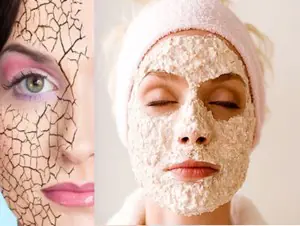
Everyone can face a dermatological problem where the skin peels. This causes discomfort because it feels itchy. This phenomenon may be caused by a lack of vitamins, some disease or improper care. Therefore, before eliminating peeling of the cheeks, chin or forehead, it is very important to find out the reason for the body’s reaction. Otherwise the problem will repeat again.
Possible reasons
Dermatological the problem is a lot of trouble. Sometimes the skin on the cheeks is red and peels. Sometimes the roughness is not visually noticeable, but it can be determined by touch. In both cases, it is necessary to take measures to restore the epidermis.
You can tell whether the skin is healthy or not if you touch it with your fingers. In the absence of unpleasant phenomena, the surface of the dermis is smooth and velvety. If there are irregularities, bumps, roughness, or the skin begins to peel off, this indicates a problem that needs to be dealt with.
Skin diseases
A visit to a specialist will help you find out why the skin on your cheeks is peeling. He is able to determine whether there are the following dermatological diseases:
- Ichthyosis.
- Allergic reaction of the diathesis type.
- Psoriasis.
- Seborrheic dermatitis.

The causes of ichthyosis are still unknown. There are suggestions that the disease is inherited and through contact with a sick person. As a rule, ichthyosis first affects the arms, feet or legs, and then may appear on the face. In this case, the skin on the forehead, chin, and cheeks turns red and peels, and may have a grayish-dirty tint.
Dry skin on the cheeks of an adult is due to allergies. With this phenomenon, the cheeks peel and become red. The top layer of the epidermis dies.
With psoriasis, flaky spots appear on the skin, which are difficult to hide with any means.
The symptoms of seborrheic dermatitis are similar to those of psoriasis, but the peeling may be more severe. The location of irritation is the area around the nose.
This does not end the list of dermatological diseases that cause flaking of the skin, which only a doctor can help identify. Based on the test results, the dermatologist will make an accurate diagnosis and prescribe treatment.
Hormonal disbalance
When a person goes through certain stages of life, he hormonal levels can change. For example, this is puberty, pregnancy, lactation and menopause. At each of these stages, a change in hormonal levels occurs, which can affect the dermis.
The teenage period is characterized by hormonal imbalance, a surge of testosterone and progesterone. This can lead to dryness and flaking of the dermis. As a rule, this goes away with age, but there are times when a visit to an endocrinologist is indispensable.
Women's skin may become dry and flaky during pregnancy and breastfeeding. Usually the problem disappears after childbirth and after completion of lactation, but during the period of hormonal changes it is recommended to moisturize the skin well.
During menopause, women also face dermatological problems. Peeling of the dermis occurs due to a lack of estrogens, which are responsible for the regeneration of the skin. A gynecologist-endocrinologist will help solve the problem and prescribe hormonal therapy if there are no contraindications.
You should not try to cope with peeling of the dermis caused by hormonal imbalance, since self-treatment can be harmful. Therefore, you cannot do without consulting a specialist.
Lifestyle and ecology
Peeling skin on the cheeks can occur due to poor nutrition, bad habits and environmental factors:
- Allergy due to abuse of fried, fatty, salty and sweet foods.
- Dryness and dehydration of the dermis due to lack of water in the body. It is worth remembering that in addition to tea and coffee, you need to drink at least 1.5 liters of clean water per day.
- It is very important to get enough sleep and walk in the fresh air as much as possible. Prolonged stay in a stuffy room negatively affects the epidermis.
- Drinking alcohol and smoking have a destructive effect on the cells of the body. Intoxication causes thinning of the epidermis, which causes sagging, wrinkles and flaking.
- Unfavorable environmental factors, such as emissions of heavy metals into the atmosphere or chlorinated water, slow down growth and destroy healthy epidermal cells.
- In autumn and winter, special care for the skin of the face and lips is required. This will help avoid chapping and peeling.
- The sun's ultraviolet rays have a detrimental effect on the dermis. In hot weather, cell dehydration occurs. To prevent the upper layer of the epidermis from drying out, it is recommended to use sunscreen in spring and summer, avoid prolonged exposure to the sun, and moisturize the skin.
- If the body does not receive enough vitamins, metabolic disorders occur, resulting in dryness and flaking on the face and other parts of the body. Vitamins A and B2 are especially important for the dermis.
Improper care

Very often, severe peeling of the skin is caused by improper care. The problem arises when using some means:
- It is not recommended to use lotions that contain alcohol. It is especially undesirable to do this if you have dry skin.
- For washing, it is better to choose soap that does not contain alkali, fragrances or fragrances. Such chemistry causes dryness, dehydration and allergic dermatitis.
- The cream should be chosen according to your skin type and age.
Solving the problem yourself
Help the problem skin can be done at home using special cosmetics:
- Natural oils, such as olive, orange, coconut or almond, are an excellent remedy for peeling the epidermis.
- You can make face masks with the addition of essential oils.
- Hot water and soap harms the dermis. It is better to use gel or foam for washing.
- It is recommended to take multivitamins; the presence of vitamins A, B and E is especially important.
- Do not use moisturizer before going outside in frosty weather.
- Sunscreen and thermal water will help protect your skin from crusting in summer.
- A homemade cream made from cream and butter will help cope with peeling of the dermis.
- It is very important to monitor your diet and follow the drinking regime. Your skin will be healthy if you give up cigarettes and alcohol and limit your coffee consumption.
- Exercising will relieve the body of stagnation of blood and lymph. Thanks to this, the cells will receive a sufficient amount of oxygen and nutrients and get rid of toxins.
- Frequent exposure to fresh air will help prevent dry skin.
As a rule, you can deal with rough skin yourself at home. But if the problem is associated with any disease, consultation with a specialist is necessary.
Dry facial skin causes no less trouble than oily skin: it looks sluggish and lifeless, wrinkles appear earlier, constant peeling, itching... Such skin needs special careful care. You will learn everything about how to save the situation and get rid of dry skin on your face from the article.
Hi all. Svetlana Morozova is with you. Those with dry skin will agree - it is difficult to constantly moisturize, nourish and protect the skin, select suitable decorative cosmetics, and cleanse the face. In response to many remedies, irritation occurs.
Friends! I, Svetlana Morozova, invite you to mega useful and interesting webinars! Presenter: Andrey Eroshkin. Health restoration expert, registered dietitian.
Topics of upcoming webinars:
- How to lose weight without willpower and prevent the weight from coming back?
- How to become healthy again without pills, the natural way?
- Where do kidney stones come from and what can be done to prevent them from appearing again?
- How to stop visiting gynecologists, give birth to a healthy child and not grow old at 40?
Therefore, today I will tell you how to properly care for skin prone to dryness in youth and after 40 years, what vitamins to take, what clay is suitable for dry skin, what to make masks from, what procedures are used in salons - read on about this and much more. .
Dry facial skin: looking for the cause
Dry and sensitive skin becomes due to lack of moisture and sebum. And it depends on the reason what needs to be done in this case.

Why does the skin dry out?
- Genetics. Moisturizing is primarily affected by the thickness of the skin, and this feature is inherent from birth. And it is genetics that decides when you begin to show signs of aging (and dryness is one of them) - after 30 or even after 50.
- Allergies, both food and to household chemicals and cosmetics.
- Accumulation of toxins. These include habitual nicotine intoxication, long-term use of certain groups of medications, food poisoning, and even worms.
- Lack of fluid. If you drink less than 1.5-2 liters per day, your skin will be dry.
- Hypovitaminosis. Often dry lips and skin are a manifestation of a deficiency of fat-soluble vitamins A, E, D. This happens either due to a lack of protein and healthy fats in food, or due to impaired absorption of vitamins. This is especially noticeable in winter and spring.
- Calcium deficiency. Dehydration of the skin may indicate a lack of calcium in food or its poor absorption. There may be a connection with a lack of vitamin D or magnesium, phosphorus. Dry skin in children is just a sign of rickets.
- Diseases of the digestive system. Gastritis, ulcers, intestinal disorders, and liver dysfunction interfere with the absorption of vitamins, microelements, fats and protein.
- Kidney diseases. If dry skin is combined with itching or swelling, this indicates an imbalance in the water-salt balance in the body.
- Hormonal changes, especially in women. Peeling and dryness of the skin of the face and hands are frequent accompaniments of menopause, pregnancy, the postpartum period and sometimes puberty in a teenager.
- Environmental aggression: temperature – both heat and frost; low air humidity; ultraviolet radiation - aggressive sun or frequent visits to the solarium dry out the skin, just like living in the far north with a lack of sun. This also includes occupational hazards: steam, hot or cold air, contact with chemical fumes, and even long work at the computer.
- Incompetent facial care: too frequent washing and exfoliation, roughly wiping the face with a towel, using harsh (with alcohol) or simply inappropriate cosmetics.
And, of course, stress and lack of sleep really damage your skin.

How to understand if your skin's oil content is below normal
There is a very fine line between normal and dry skin. What signs indicate that your face needs extra hydration:
- Often there is a rash, irritation, redness, itching;
- In the corners of the mouth, between the eyebrows, on the cheekbones and lower eyelids, under the cheeks on the chin, the skin peels off;
- The skin turns pale, thins, small blood vessels appear, circles appear under the eyes;
- When you go out into the cold, your face begins to hurt, redness and a feeling of tightness immediately appear;
- Redness, itching after playing sports, going out in the sun, even a short swim in the sea or pool.
If these signs are combined with severe itching, be sure to visit a doctor. These may be symptoms of some dermatological diseases, for example, eczema, seborrhea, fungus.
Salon treatments to combat dry skin
Cosmetologists approach the treatment of dry skin in a comprehensive manner. What methods are used for this:
- Hot compresses;
- Peeling: salt, mechanical, hardware, chemical;
- Face massage;
- Masks with collagen, oils, wax, clay;
- Mesotherapy (intradermal injections) with vitamins and fatty acids;
- Biorevitalization (injections with hyaluronic acid), used mainly after 35 years.
Each procedure will require several sessions. Salon treatment is effective, but the cost ranges from 20 to 100 thousand.

Home care
To care for dry facial skin, masks, scrubs, creams, lotions, and compresses are made at home. They are formulated based on moisturizing ingredients:
- Oils: olive, grape seed, jojoba, avocado, jasmine, wheat germ, rose, coconut, almond, sandalwood, apricot, peach;
- Vitamins A and E;
- Honey;
- Gommage;
- Eggs;
- Decoctions of herbs: parsley, chamomile, linden, nettle, violet, coltsfoot, yarrow, hops;
- Clay: pink, green, red and gray (blue and white are more suitable for oily and normal skin);
- Moisture-retaining glycerin, gelatin, hyaluronic acid, panthenol;
- Dairy fats: sour cream, cream, yogurt, milk, whey;
- Extracts of algae, vanilla, herbs.
- Puree: banana, cucumber, aloe, mango, avocado.
- Exfoliating pastes: oatmeal, almond and corn flour, sugar, salt, ground nuts.
All this can be applied separately, or mixed with each other as you like.
Here are a couple of effective recipes:
- Banana scrub. Mash the banana, add 2 tbsp. l. sugar and 5 drops of vanilla extract. Apply the mixture, lightly massage your face and rinse with warm water.
- Oatmeal mask. Oatmeal (1 tbsp) pour 2 tbsp. l. hot heavy cream. Leave for 5-10 minutes, apply to face, wash off after 15 minutes.
- Aloe mask. Suitable for sensitive skin around the eyes. Cut the aloe leaf lengthwise, clean out the pulp and apply the puree for 10-15 minutes.
After the procedure, be sure to apply moisturizer.

How to care for dry skin
Every skin type has its own home care rules. Here are some basic tips from a cosmetologist for those with dry skin:
- Don't wash your entire face in the morning. Otherwise, the protective barrier that forms on the skin overnight is washed away. It is enough to wash your eyes and brush your teeth.
- Monitor the water temperature. Do not take a hot bath or shower, as moisture from steamed pores will evaporate even more.
- Use soft water. Often tap water is too hard. Either filter it separately for washing, or use micellar and distilled water. Ideally with the addition of soothing herbal infusions (chamomile, for example).
- Remove makeup at night. Choose a softening gel or milk, alcohol-free lotion. Do not use any facial soap.
- Choose the contents of your cosmetic bag carefully. Use cosmetics for sensitive skin with oils. Apply foundation only to a moisturizing base for dry skin, and lipstick to lip balm.
- Moisturize your facial skin both morning and evening. In summer, apply sunscreen before going outside. And in winter, make sure that after applying the cream, at least half an hour passes before going out into the cold. Otherwise, unabsorbed moisture crystallizes in the cold and injures the skin even more.
- Make masks for dry skin 1-2 times a week.
What else should you do for dry skin:
- Drink enough water. The recommended dosage is 30 ml for each kg of weight. Coffee and strong tea should be limited, and soda, sweet juices and alcohol in any form should be excluded altogether.
- Eat properly. For beautiful, healthy skin you need protein from lean meat, fish and eggs, unsaturated fats from vegetable oils, nuts, low-fat dairy products, enough complex carbohydrates from vegetables and cereals for good digestion. And dryness is provoked by pickles, sweets, flour, fatty, fried foods.
- Protect your skin from the sun, wind and frost with hats and accessories.
- Take vitamin and mineral complexes. They must be prescribed by a doctor. The most popular complexes: Lady’s Formula, Merz, Alphabet Cosmetic, Viardot, Vitrum Beauty, Doppelgerz, Complivit Radiance. As reviews say, sometimes the best option is simple and inexpensive fish oil.
- Regularly perform special gymnastics for the face. Exercises rejuvenate, improve blood circulation, supply tissues with moisture, and remove toxins. The sooner you start, the longer you will maintain your youth, and dry facial skin will not bother you.
Write comments, share the article on social networks, subscribe to updates.
If you have flaky skin on your face, you should first find out the cause of this phenomenon. Perhaps this is the result of exposure to frosty air or under strong ultraviolet rays, then solving the problem will be quite simple, or maybe the reason is more serious, then you should first take care of your health and undergo treatment. In this publication we will talk about what causes peeling skin on the face and ways to independently eliminate this problem.
Possible causes of peeling
Peeling skin feels like very fine sandpaper and is no fun to touch. But why does she become like this? For some reason, the keratinized particles of the upper layer of the epidermis are not washed off, but remain on the face, new ones join them, then more, and this can happen endlessly. This is why it is so important to determine the cause of facial peeling.
At different age stages, a person experiences hormonal changes. Everyone is familiar with the time of maturation of sex hormones during adolescence in both boys and girls. For women, in addition to this period, the period of pregnancy and breastfeeding, as well as menopause, when the activity of sex hormones fades, is difficult hormonally. At each of the listed stages, changes occur in the body that are reflected in the skin:
- Foods with a predominance of fatty, fried, salty and too sweet can cause allergic reactions in the body; red, flaky spots appear on the skin quite quickly.
- Lack of water in the body causes dehydration of the epidermis, the skin becomes dry, and peeling occurs. Don't forget to drink clean water; tea and coffee alone are not enough. To keep your skin hydrated, you need to drink at least 1.5 liters of clean water daily.
- A small amount of sleep, staying in a dry, stuffy room, lack of walks and outdoor activities - all this also provokes flaky skin.
- Alcohol and smoking poison and destroy body cells. The skin is the first to react to intoxication, thinning, becoming flabby and wrinkled. It becomes especially flaky without proper care.
- The polluted air of industrial cities with constant emissions of heavy metals into the atmosphere, drinking water contaminated with bleach and other substances that destroy skin cells, and other unfavorable environmental factors hinder the growth of healthy skin cells.
- Alcohol-containing lotions. For dry skin, alcohol is enemy number one. Never remove leftover makeup with an alcohol-based lotion before going to bed. You should not use it in the morning if you have dry skin. Don’t do this either when you’re young or, especially, when you’re mature.
- Soap based on chemical ingredients. Fragrances, fragrances and other chemicals contained in soap dehydrate the skin, dry it out and cause allergic dermatitis. You can wash your face with soap, but not alkaline; it must be of high quality and soft.
- Natural oils that do not contain fragrances solve the problem very well. Unfortunately, sunflower oil will not work here because it does not contain Omega-3 acid. But there is plenty of it in olive oil, as well as in almond, orange, coconut, argan and many others.
- Pharmacies sell a huge number of different oils in small bottles. Place them on your shelf and use them daily, adding them to all kinds of masks or applying them to the skin as an independent cosmetic product.
Conclusion
It is impossible to deal with severe peeling of facial skin on your own only if it is caused by a disease. Here you need to act together with a specialist, combining treatment with caring procedures. However, in most cases, flaking of facial skin can be eliminated at home using traditional methods.






